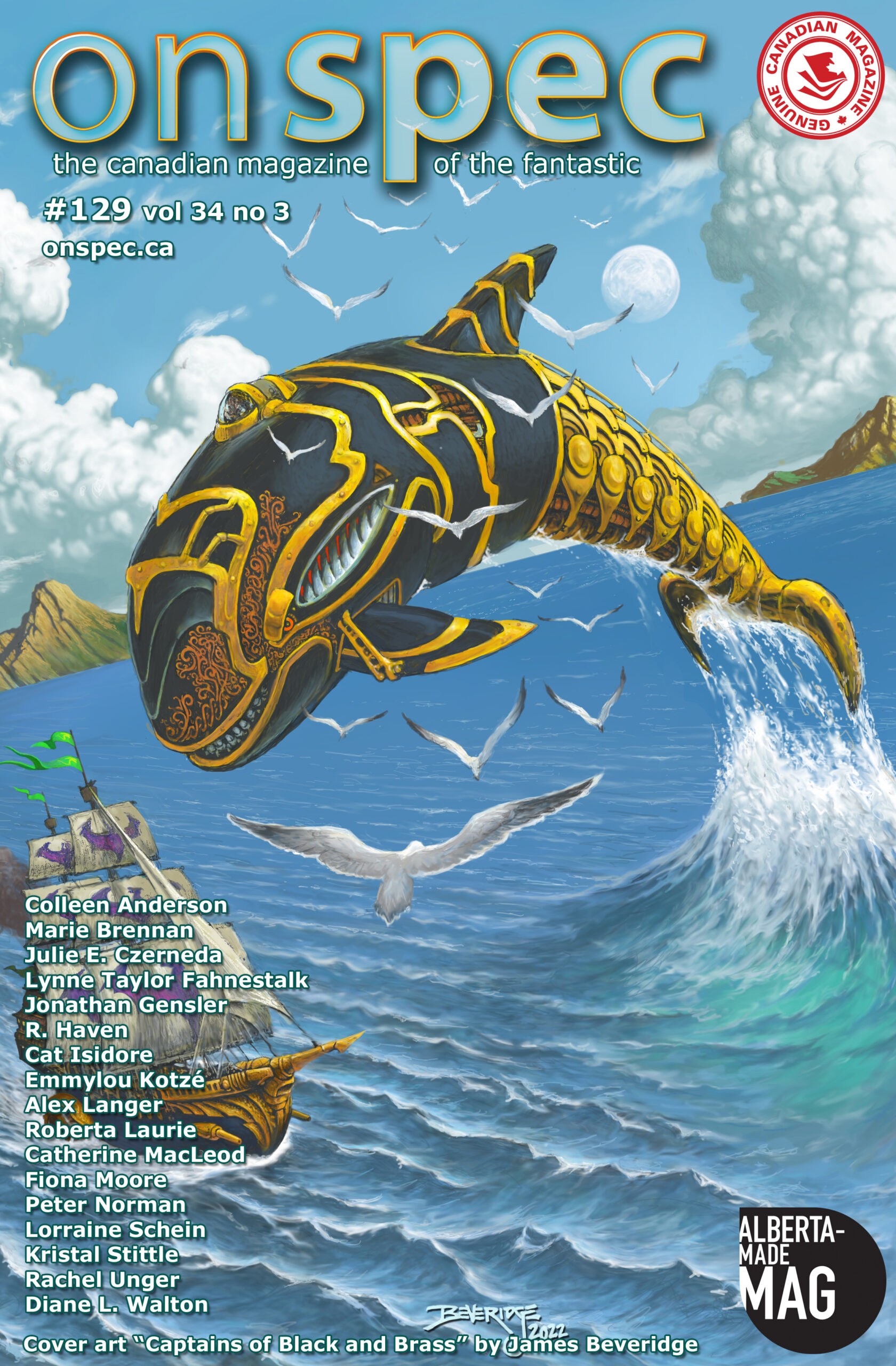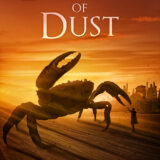
OBIR: Occasional Biased and Ignorant Reviews reflecting this reader’s opinion.

ON SPEC MAGAZINE issue #129, Vol. 34 No. 3.
Publisher: The Copper Pig Writer’s Society. Managing Editor and Art Director: Diane L. Walton.
Issue Designer: Jerry LePage. Poetry Editors: Celine Low & Colleen Anderson.
Fiction Editors: Barb Galler-Smith, Virginia O’Dine, Constantine Kaoukakis, Susan MacGregor, Ann Marston, Krystle McGraith, A.J. Wells, Diane L. Walton, Dan Gyoba, Ethan Zou, Alyssa Kulchisky, Celine Low, Lareina Abbott, Cheryl Merkel, Jade Mah-Vierling, Asley Alton, Jessica Zdril, & Thomas Schwarz.
Cover Art: Captains of Black and Brass – by James Beveridge
FICTION:
Saving Week – by Julie E. Czerneda
Premise:
Can a wizard save the world? Yes, but there’s a price to pay.
Review:
This is a jolly story which turns expectations inside out. I found it a wonderfully original take on a topic long believed to be a cliché. It takes a highly talented writer like Julie to prove fantasy isn’t dead yet, that it’s possible to inject freshness and vigour to produce a delightful read. This tale left me smiling.
Giant of the Stars – by Alex Langer
Premise:
An unusual version of the biblical tale of David and Goliath.
Review:
I’ll throw in just one spoiler. What if David had been clever enough to scout out the character of the giant champion of the enemy before their encounter on the battlefield? What would be the consequences of knowing the true story of Goliath’s life, background, and motivation? And would knowing the enemy help David fulfill his destiny or reduce his chances for success?
This is a good example of speculative aspects “fleshing out” the characters in a traditional myth to the point of rendering both the characters and the myth itself more explicable to modern readers. Whether myth or recorded miracle is beside the point. If the young David were a real person, because I have read this story, I feel I understand him better.
That’s why I consider this a remarkable work of fiction. It brings the past alive, makes it seem real, as opposed to boring Sunday school classes. I was expelled from Sunday school at a young age. I kept asking too many questions. Had they read this story to me, I suspect I would have wanted to stick around. Being asked to learn fairy tales by rote had no appeal to me. Being asked to explore the “what if” implications if the legends were real would have intrigued me. Hence the value of a story like this. Dare I say it is the proper way for a modern writer to interpret the work of ancient scribes? I consider Alex’s treatment brilliant.
In the Ghost Kitchen – (poem) by Lorraine Schein
Premise:
There will be kitchens in the afterlife.
Review:
An amusing parody of modern Uber-order fast food joints, albeit with a powerful punchline that reminds us what death is really all about.
Rubberized – by Kristal Stittle
Premise:
Shopping is a lot harder after a nuclear war.
Review:
A rubber mask is good for filtering out toxins, radioactive particles and mutated bacteria. Pity it filters out smells as well. When out in the world, all a mother and son team can smell is their masks. As good a way as any to remind them their options have become permanently limited.
This low-key story is a gentle reminder that there is more to survival than merely surviving. Thought-provoking.
The Noon-Day Witch – (poem) by Lorraine Schein
Premise:
The Noon-Day Witch is something you’ve heard of.
Review:
Even worse, the fury of her curse is inevitable. With a bit of luck, we’ll all be dead before it happens. Vivid and frightening imagery.
The Butterfly Effect – by Catherine MacLeod
Premise:
Monarch Butterflies are cute, beautiful, endangered and…?
Review:
The town of Calithine doesn’t have any butterflies except when they migrate through. This attracts tourists. Most people in town just want to escape to a better life somewhere else. Dino sells butterfly souvenirs. Meanwhile he’s taking a correspondence course on how to be a private detective. Good thing too. Gives him something to think about when his friend Sherry is murdered. Like, who did it? Or, what did it? The more he investigates, the more paranoid he becomes.
The story starts slow as a small-town character study, then gradually rises to a high level of creepiness which gets under your skin. Even paranoiacs have enemies, but when one starts embracing their fears genuine enemies are apt to be unnoticed until its too late. How DO you wake up from a nightmare that’s real? “Nothing to fear but fear itself.” Indeed. Unnerving story.
Freezer Burn – by Cat Isidore
Premise:
Going to the dog park is always a good outing, unless it’s a Canadian dog park…
Review:
In 1970 I was visiting a friend’s relatives in London, England, and they were all atwitter about the endless snow wastes of Canada, our wonderful igloos and what not. I tried to explain most of us lived in big cities and snow was just a minor nuisance. They didn’t believe me. They informed me a TV documentary about Canada was about to begin. They poured me some warm beer and we sat down to watch.
Alas, it turned out to be the first episode of a series on Canada, this one titled “Canada, the Frozen North,” featuring footage of people fending off polar bears climbing through their kitchen windows and such. “Aha! We told you!” The Brits proclaimed. “Why did you lie to us?”
I, myself, only got stuck in muskeg once, fell through river ice on just the one occasion and, while I did lose a staring contest with a wolverine, it was behind bars in a zoo and not especially dangerous, just angry. Nevertheless, snow is a thing in Canada. I know what it’s like to have one’s nostrils freeze shut, have eyelashes sparkling like diamonds, and feel bone-chilled to the point of utter exhaustion. So, yeah, there’s something very Canadian about the deadly beauty of snow when a blizzard blows.
In this story visiting a city dog park in the dead stillness of a winter evening is revealed to be a bad idea, especially when the not-so-natural inhabitants show up. What is particularly attractive in the story, as an example of Canadiana, is how perversely enticing freezing can be. It often creates a sense of euphoria, as if the solution to the problem is at hand.
Frankly, being warm indoors on a cold winter’s night is a better choice. The imagery in this story vividly demonstrates why that is so. A very Canadian story.
You Ain’t Supposed to Die on a Saturday Night– by Jonathan Gensler
Premise:
Music has power, they say. Maybe too much power.
Review:
I used to enjoy concerts. Been to quite a few in my day. Seen Jimmy Hendrix open for the Monkees, seen the Beatles, the Rolling Stones, Jerry Lee Lewis, Fats Domino, Chuck Berry, Iggy Pop, Doug and the Slugs, D.O.A., the Subhumans, James Brown, John Lee Hooker, B.B. King, and I forget who else. Now I avoid concerts. Too crowded. Too noisy. And at my age, I’m afeared I might drop dead.
In this story the title song is the one song fanatical fans insist Johnny Fire and his band play whenever they have a gig at the Paramount. People have noticed that every time they perform the number a relative or friend of Johnny’s dies horribly. Now he’s run out of relatives and friends. How can he top what happened before? He’s curious to find out.
People often lose their inhibitions, even their individuality, in the raw emotion of a rock ‘n roll concert. That’s what I fear most of all, loss of self-control. Granted, death is even more of a downer. But becoming part of a mob is frightening to me. This story is unsettling, because it evokes all the negative aspects of what a concert experience can be like.
After all, Mick Jagger once seriously commented that Adolf Hitler was the first true rock star. Think about it. I understand what Jagger means. Scares me. So, too, this story.
Approaching Storm – (Poem) by Emmylou Kotzé
Premise:
The title describes the premise.
Review:
Rich imagery evokes the promise and violence of the inevitable.
The Blood Webs – by Fiona Moore
Premise:
Pity Mom and Dad are still alive, what with being cocooned in the attic and all.
Review:
Liv finds it difficult to concentrate at work. Somewhere in the attic there’s got to be a giant spider, but it’s so difficult to keep the space free of dust and webbing that it’s all she can do to quietly spend time communing with her father, whose eyes remain expressive. Somehow, it’s not much of a solution. She doesn’t know what to do. She feels trapped.
A reflective, contemplative horror story. It’s really a metaphor for something we all become familiar with if we live long enough. Individuals cope or attempt to cope with the pain and stress each in their own way. I like to think we all eventually figure out how to defeat the spider. Or we die first. One or the other. Either way, problem solved.
Bargains – by Rachel Unger
Premise:
Nursing homes have many problems. Sometimes only the supernatural can help.
Review:
Of course, only an idiot would make a deal with the Devil. Far better to bargain with a Faery. Or is it? They’re so finicky about specific details. Positively obsessed, in fact.
The joy of this story lies in the details. Rebecca is such an amateur she sets up needless complications despite her opposite number feeling sorry for her and dropping broad hints to guide her through the process. Unfortunately, she assumes trickery and fails to heed well-meant advice. Rebecca is forced to use her wits to cope with the unexpected results of her bargain. Sealing the deal is merely the beginning of what challenges her. Makes for a whimsical and entertaining story.
Before Her Eyes – by R.Haven
Premise:
Widow loves her spaceship AI so much she wants to give it a body. Pity about the space pirates.
Review:
In a sense this is old-fashioned space opera combined with modern visions of high tech which makes for plenty of fisticuffs against nasty aliens with claws and ray guns. Loads of fun. But it is also a story about commitment and long-delayed true love which provides a worthy goal despite all hardships. A ripping good yarn with heart. Entertaining.
Legio XVII Inquieta – by Marie Brennan
Premise:
What do you do when you discover the intact eagle standard of a Roman legion wiped out by the Germans about 2,000 years ago?
Review:
Not the complete standard, just the bronze eagle it carried at its tip. As a kid still in grade school, reading my older brother’s 1959 high school copy of The Eagle of the Ninth, by Rosemary Sutcliff (which I still have), this story brings a lump to my throat.
I am in the habit of reading books about ancient Rome, most recently Ancient Rome in the Light of Recent Discoveries by Rodolfo Lanciani (1894), Legions of Rome: The Definitive History of Every Imperial Roman Legion, by Stephen Dando-Collins (2010), and Laughter in Ancient Rome by Mary Beard (2015). I’m quite the nerd on the subject. I no longer read generic introductory histories; I look for detailed studies devoted to narrowly focused minutiae which I find absolutely fascinating.
It may well be that those who know Rome only from movies and TV shows (even the best of which are woefully inaccurate) will find this story far fetched and perhaps a trifle corny. What’s the big deal they may ask?
Well, amateur and dilettante though I may be (I read through all the penguin translations of Latin literature before I graduated from high school in 1970) I don’t think I’m exaggerating when I say I understand how the Romans felt about their eagle standards. I fully identify with what the archaeologist in this story does and why. Her actions and motivations resonate with me. Consequently, this is a story I will never forget.
Atalanta Runs – by Colleen Anderson
Premise:
Imagine being a woman imprisoned by a pervert who makes Dr. Moreau seem like Mr. Rogers. Wouldn’t you want to escape?
Review:
Yes, aspects of H.G. Wells The Island of Dr. Moreau in this tale add to the horror. And it IS a horror story. Visceral in its depiction of a desperate flight for freedom. There are hints the entire world has become toxic and depraved while the protagonist was imprisoned. Also hints that the beast within is common to us all no matter the gender. And hints that our animal nature is both a curse and a key to salvation. After all, the instinct of every living thing is that the purpose of life is to live. Ask any cornered rat.
There are complexities within complexities. Much to ponder. Still, unless they are as perverse as the villain, I’m sure every reader roots for the protagonist to escape. The villain, not present most of the story, is not one of your entertaining over-the-top James Bond movie villains, but a true villain, a genuinely human monster all too common in the world today.
But the real horror, the true horror, is the state of oppression the woman has endured for years of her life. Her terror is credibly and convincingly real. Alas, millions of people worldwide, regardless of gender, faith, or ethnicity, are experiencing the terror Colleen conveys in her story, the terror of a trapped animal seemingly doomed and with no means of escape.
One of the most powerful tales of what misery evil produces that I have read in a long time. And, I deeply regret to say, an educational story worth reading, if only to countermand the empty platitudes of the “happy, happy, joy joy” faddists. Depressing, yes, but that’s the real world. Victims of oppression don’t kill themselves. There are plenty of gleeful executioners out there.
Well written, impactful and evocative, at best this tale implies we can do better. I agree.
Advice Fail,X3 – (poem) by Peter Norman
Premise:
Hard to give advice when people don’t want to hear it.
Review:
An unusual, well-done horror interpretation of a common problem, although in this particular case, a problem no one ever wants to confront.
NON-FICTION:
“Do Editors Get a Break?” – Editorial – by Diane L. Walton
Not quite. Diane explains that costs have crept beyond funding level and it is now necessary to increase the print subscription cost. My Polar Borealis Magazine doesn’t have this problem. It’s always broke, and thus immune to market forces.
Diane also describes the time-consuming effort to process behind-the-scenes tasks like “the day-to-day aspects of managing a subscriber database, mailing new orders for copies and ongoing subscription renewal efforts.” My one-man Polar Borealis operation does none of that. I get to concentrate on the fun stuff, namely acquisitions, editing, and layout. I be one lucky editor.
“Catherine MacLeod Growls Back” – Author Interview – by Roberta Laurie
Catherine has very interesting things to say about the writing process. Even more interesting things to say about the hostility many people feel toward writers. In my own experience I’ve mostly encountered indifference. Telling people you write is like telling people you collect bottlecaps. End of conversation. But in Catherine’s case, she’s experienced a lot of proactive hostility. I can think of several reasons. People think you should know you’re wasting your time, or believe you’re mentally lazy, or unable to cope with either people or reality, or worst of all, that you’re a stuck-up elitist who needs to be taken down a notch or two. Heck, I used to have a manager who’d walk into the lunchroom just to laugh at me for sitting there reading a book. I didn’t dare tell her I wrote as well. I’d probably get fired. So, yeah, I can see it when I think about it. Catherine’s suggestion to growl at these naysayers is good advice. Keep them at arms length. Always.
James Beverage Retrospective
Twelve full-colour reproductions of beautiful On Spec covers by the artist.
Comic & Bot: “Earl” & “Lenny” – By Lynne Taylor Fahnestalk
Always worth a chuckle or two. The skill that goes into both is amazing.
CONCLUSION:
Once again On Spec is a splendidly eclectic mix of original and even provocative fiction. Always a good read.
P.S. I am always happy to see the half-page ad for my Polar Borealis and Polar Starlight Magazines in On Spec. It features magnificent art by M.D. Jackson. This issue it’s at page 10.
Check it out at: < On Spec Magazine #129 >











1 Comment